PCOS Weight Loss Diet: Guide to Losing Weight & Balancing Hormones
If you’ve been diagnosed with PCOS and feel like you’re doing everything right but the weight just won’t budge, you’re not alone. PCOS (Polycystic Ovary Syndrome) affects 1 in 10 women of reproductive age and often leads to insulin resistance, hormonal imbalances, and difficulty losing weight. But here’s the good news: the right PCOS diet can help you lose weight, balance hormones, and feel more energized.
Living with PCOS can make nutrition feel overwhelming, but having a structured meal plan helps bring clarity and consistency. That’s why I created this 7-Day PCOS Diet Plan PDF—to give you practical, dietitian-approved meals that balance blood sugar, support hormone health, and fit into your busy life. If you’re looking for even more structured options, I also offer PCOS meal plans with calorie ranges from 1200–2000, complete with grocery lists and recipes tailored to your goals.
One of the most common challenges I hear from clients is starting the day without enough protein. A balanced breakfast sets the tone for your energy, cravings, and focus. That’s why I put together a guide with my favorite high-protein PCOS breakfasts for weight loss—easy ideas you can prep in minutes that actually keep you full until lunch.
Why PCOS Makes Weight Loss Tricky
What Is PCOS & How It Affects Metabolism
Polycystic Ovary Syndrome is a hormonal disorder that can disrupt ovulation and increase levels of androgens (male hormones). These hormonal imbalances can:
Increase fat storage, particularly in the abdomen
Slow metabolic rate
Make you more prone to insulin resistance
When insulin levels are high, your body stores more fat and struggles to burn it efficiently.
Insulin Resistance: The Hidden Barrier
Insulin resistance is one of the most common drivers of weight gain in PCOS. It means your cells aren’t responding well to insulin, so your body produces more of it. High insulin levels increase hunger, cravings, and fat storage.
Want to dive deeper into insulin resistance? Read this NIH overview on insulin and metabolism.
Inflammation, Hormones & Cravings
Chronic low-grade inflammation is common in PCOS. This can:
Worsen insulin resistance
Trigger cortisol spikes
Lead to intense cravings for sugar and refined carbs
The result? A vicious cycle that makes it hard to stay consistent.
The Best Diet for PCOS Weight Loss: Foods to Eat & Avoid
The most effective diet for PCOS targets insulin levels, inflammation, and hormone regulation. Here’s what to focus on.
Top PCOS-Friendly Foods for Fat Loss
Lean protein: Eggs, turkey, tofu, chicken, legumes
Low-glycemic carbs: Sweet potatoes, quinoa, oats, lentils
Healthy fats: Avocado, olive oil, flaxseeds, chia seeds
Non-starchy veggies: Kale, spinach, bell peppers, zucchini
Berries & fiber-rich fruits: Blueberries, raspberries, apples
Fermented foods: Sauerkraut, kimchi, kefir for gut health
Add anti-inflammatory herbs like turmeric, ginger, and cinnamon for extra support.
High-GI & Hormone-Disrupting Foods to Limit
Refined sugars (sodas, pastries)
White bread and pasta
Fried foods and trans fats
Processed meats (sausage, bacon)
Dairy (if sensitive—many with PCOS are)
Low-GI PCOS Meals: Smart Carb Swaps
Swap white rice for quinoa or cauliflower rice
Choose whole fruit over juice
Use almond or chickpea flour for baking
7-Day PCOS Diet Plan to Lose Weight
Here’s a sample 7-day plan designed to:
Keep blood sugar steady
Support hormone balance
Deliver 1500–1800 calories with 100–120g protein per day
Download the full version here: Nutrition Guides
Days 1–3 Sample Meals
Breakfast: Veggie omelet with avocado + berries
Lunch: Grilled chicken salad with olive oil dressing + chickpeas
Snack: Greek yogurt with chia seeds
Dinner: Baked salmon, roasted sweet potatoes, sautéed kale
Days 4–7 Sample Meals
Breakfast: Protein smoothie with almond milk, berries, and flaxseed
Lunch: Turkey lettuce wraps + quinoa tabbouleh
Snack: Hummus with sliced cucumber
Dinner: Stir-fry tofu with broccoli, carrots, and brown rice
Want more structure? Grab one of our evidence-based nutrition workbooks to track meals, hunger cues, and symptom changes.
Portion & Macro Tips
Aim for 25–35g of protein per meal
Half your plate should be veggies
Use hand-based portions: palm = protein, fist = carbs, thumb = fats
PCOS Weight-Loss Diet & Exercise: The Winning Combo
Why Strength Training Speeds Fat Loss
Building muscle improves insulin sensitivity and increases your metabolic rate. Try:
Resistance bands
Dumbbells or kettlebells
Bodyweight training (squats, lunges, pushups)
Cardio & NEAT Guidelines
Non-exercise activity (like walking, cleaning, standing) helps more than you think. Aim for:
8,000–10,000 steps/day
2–3 HIIT or moderate cardio sessions/week
Recovery, Sleep & Stress
Cortisol spikes from poor sleep and stress raise insulin and cravings
Aim for 7–9 hours of sleep
Practice deep breathing, yoga, or journaling
Explore my favorite hormone-supporting Thorne supplements or Amazon wellness picks to support your goals.
Frequently Asked Questions About PCOS Diets
What is the best diet for PCOS to lose weight?
A high-protein, anti-inflammatory, low-GI diet works best. Focus on whole foods and keep your meals balanced with protein, fiber, and healthy fats.
Can you really lose weight with PCOS just by dieting?
Yes, but it often takes a more strategic and patient approach. Pairing diet with movement, stress management, and sleep support is key.
Which foods should I avoid with PCOS for weight loss?
Cut back on refined sugar, high-GI carbs, and processed foods. These spike insulin and worsen inflammation.
How do I create a PCOS meal plan for weight loss?
Start by identifying your calorie and protein needs, and structure your meals to keep blood sugar stable. Or, try a done-for-you meal plan designed specifically for PCOS.
Does a low-GI diet help PCOS weight loss?
Yes! Low-glycemic foods reduce insulin spikes and improve satiety. Learn more in this Harvard Glycemic Index resource.
Take the Next Step: Download Your FREE 7-Day PCOS Diet Plan
You don’t have to figure it all out alone. Whether you’re newly diagnosed or just tired of the confusion, this guide gives you the structure, support, and recipes you need to start strong.
Next Steps for Your PCOS Journey:
Learn more about the best foods for PCOS in the following blog posts:
PCOS Weight Loss Diet: Guide to Losing Weight & Balancing Hormones
PCOS Weight Loss Diet: Guide to Losing Weight & Balancing Hormones
Explore my in-depth PCOS guides & tools:
Supplement wisely:
Try Thorne vitamins for high-quality, research-backed nutrition support.
Browse my Amazon PCOS Essentials List
Work 1:1 with a Dietitian Nutritionist: Book a Nutrition Counseling Session to get a personalized plan and ongoing guidance. Insurance accepted.
Disclaimer: This post is for educational purposes and not a substitute for medical advice. Always consult with a healthcare provider before making significant dietary changes.


